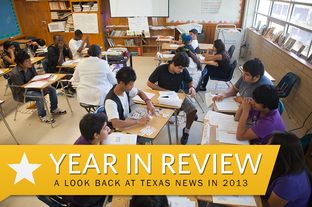Year in Review: Public Education
As 2013 comes to a close, we take a look back at some of the most important Texas stories of the year gone by.
Let’s say this outright: 2013 ranks as one of the most significant years for public education policy in Texas in the last two decades.
The last 12 months saw the rollout of a new school accountability system as the state dramatically changed course on high school curriculum and testing requirements, a direction it had followed since George W. Bush was governor. Along with the movement to scale back standardized exams, initiated by the activism of parents and educators, came an unprecedented backlash against the influence of for-profit companies in public education policy. It also brought a focus to the courses needed to earn a high school diploma, leading the Legislature to move away from requiringadvanced math and science courses for all students — a decision that continues to generate concern about how it might affect academic achievement and college preparation in the state.
The 2013 Legislature also approved the first expansion of charter schools in the state since they were established in 1995. Along the way, lawmakers lessened the State Board of Education’s involvement in the charter approval process and made it easier for high-performing charter operators to come to the state. The law’s proponents say opening the door to more seats in charter school classrooms will increase the educational opportunities for all students. But some education experts have questioned whether certain charter operators have a sufficient record of reaching out to the low-income communities whose students make up


